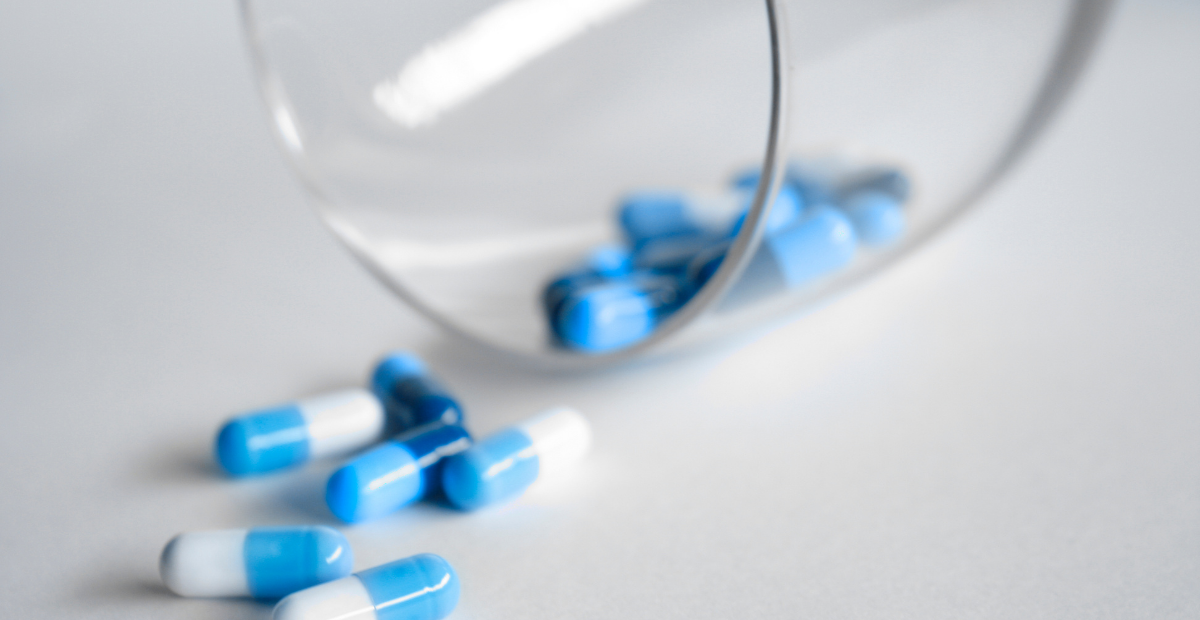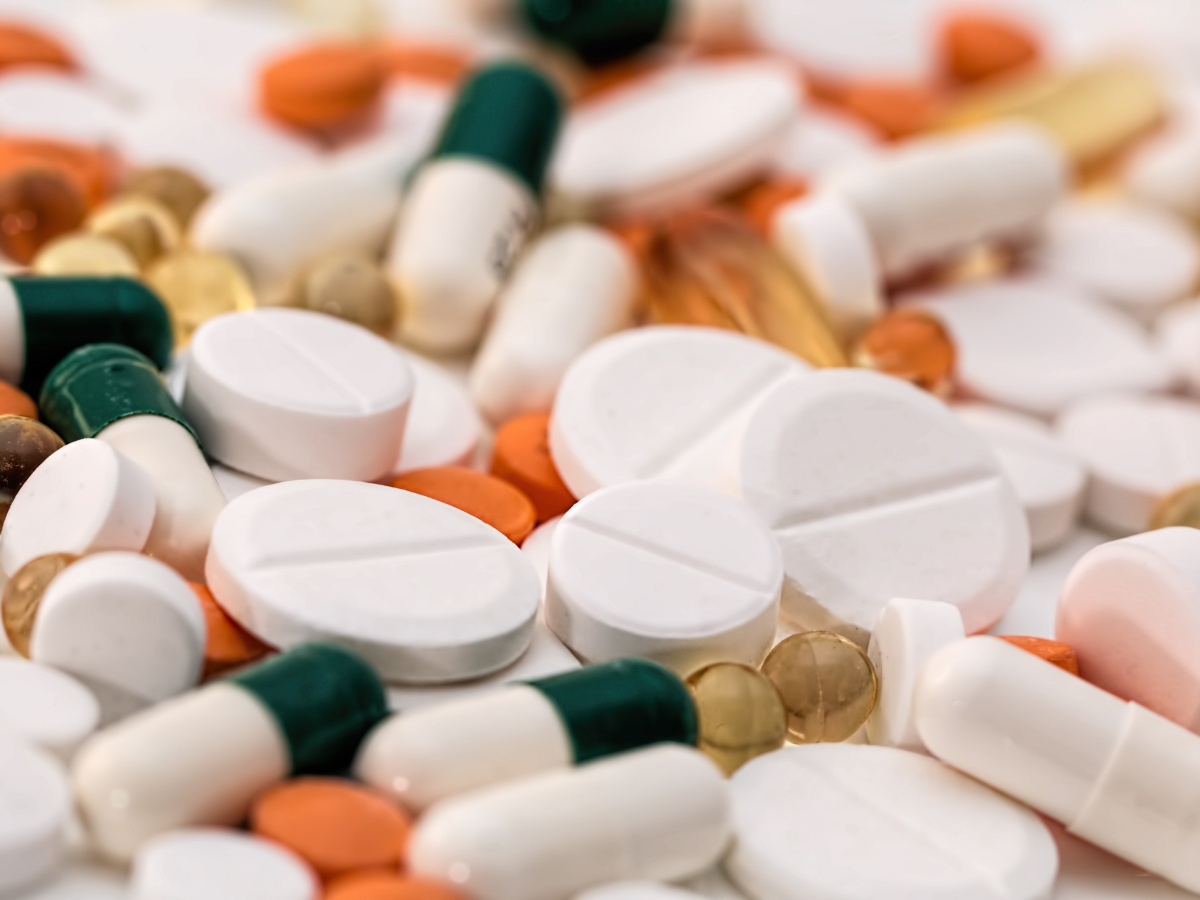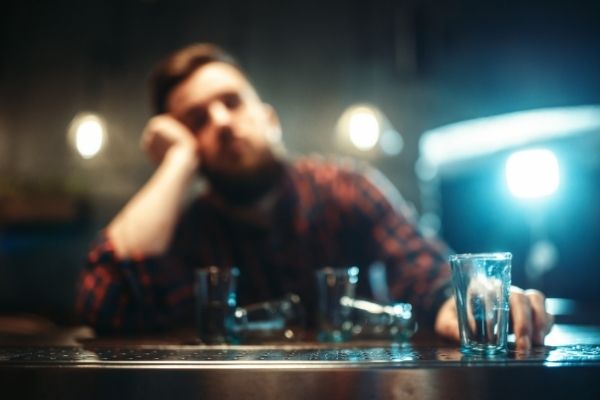What are Antibiotics?
Antibiotics are medicines that fight bacterial infections in people and animals. They work by killing the bacteria or by making it hard for the bacteria to grow and multiply. You should only take antibiotics when they are needed because they can cause side effects and can contribute to antibiotic resistance. Antibiotic resistance happens when the bacteria change and become able to resist the effects of an antibiotic. This means that the bacteria continue to grow. But can you drink antibiotics and alcohol together?
Can You Take Antibiotics and Drink Alcohol
“Can I drink antibiotics and alcohol?” is a frequent query to health care professionals. Many prescription bottles come labeled with a sticker that warns against alcohol use with the antimicrobial.
Antibiotics can sometimes interact with other medicines or substances. This means it can have an effect that is different from what you expected. It’s a good idea to avoid your alcoholism when taking medication or feeling unwell. Some antibiotics can have side effects such as feeling sick or dizzy, which might be made worse by drinking alcohol.
The Centers for Disease Control and Prevention (CDC) reported that approximately 270 million antibiotics were prescribed for outpatients in 2016. In its report on harmful interactions with alcohol, the National Institutes of Health (NIH) listed nitrofurantoin, metronidazole, griseofulvin, ketoconazole, isoniazid, cycloserine, and azithromycin. The National Consumers League and the Food and Drug Administration (FDA) have also warned consumers to avoid alcohol with linezolid, metronidazole, griseofulvin, and antimycobacterial. Alcohol warnings between pharmacy chains also differ, potentially leading to confusion for both patients and providers. [1]
Antibiotics and Alcohol Myth
Many antibiotics carry caution stickers that warn against alcohol consumption.
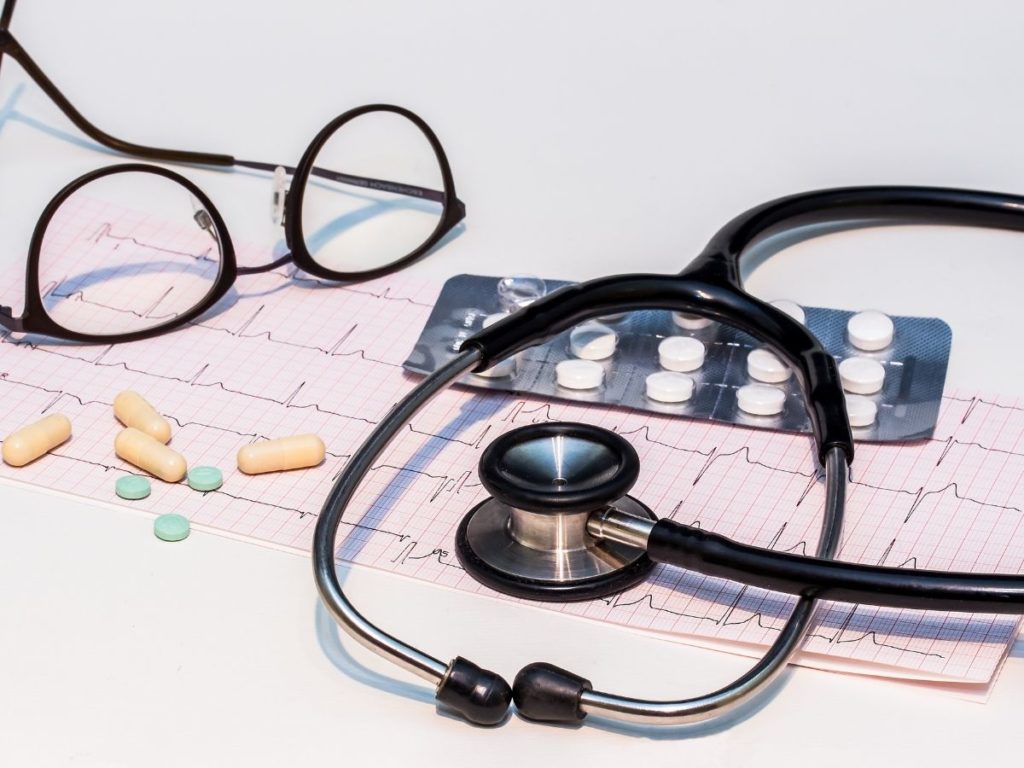
Usually, drinking alcohol won’t keep your antibiotic from working to treat your infection. Still, it can interfere with your infection’s healing in other ways. Getting enough rest and eating a nutritious diet both help you recover from sickness or infection. Drinking alcohol can interfere with these factors. For instance, drinking alcohol can disrupt your sleep patterns. It can keep you from getting a good night’s sleep.
Alcohol can also stop your body from absorbing vital nutrients. It can increase your blood sugar levels and zap your energy levels. All of these factors can reduce your body’s ability to heal from an infection. Acute alcohol use, binge drinking, and chronic alcohol use can all be harmful, whether you take medication or not.
Keep in mind that alcohol isn’t just limited to beer, wine, liquor, and mixed drinks. It can be found in some mouthwashes and cold medications, too. Check the ingredient labels on these and other products if you’ve had an alcohol-antibiotic reaction in the past. Ask your doctor if it’s safe for you to use these products while you take an antibiotic. Doctors often prescribe antibiotics for a short time. In many cases, you only need to take antibiotics for a week or two to fully recover from an infection. [2]
Can You Mix Antibiotics and Alcohol
If you take any medication—even over-the-counter (OTC) products—you should know that drinking antibiotics and alcohol might affect how your meds work. Mixing alcohol and medication can also be dangerous. The combination can lead to serious health consequences, including overdose and even death.
According to the National Institute on Alcohol Abuse and Alcoholism (NIAAA), there are several reasons that it can be harmful to mix medications and alcohol. The ways that antibiotics and alcohol interact in your body can go both ways: Alcohol can change how a medication works, and certain drugs can change how you feel the effects of alcohol.
Alcohol can make some medications less effective by interfering with how they are absorbed in the digestive tract. In some cases, alcohol increases the bioavailability of a drug, which can raise the concentration of the medication in your blood to toxic levels. Additionally, if you have an underlying health condition like heart disease or high blood pressure (hypertension), mixing alcohol with your medications can put you at risk for complications. [3]
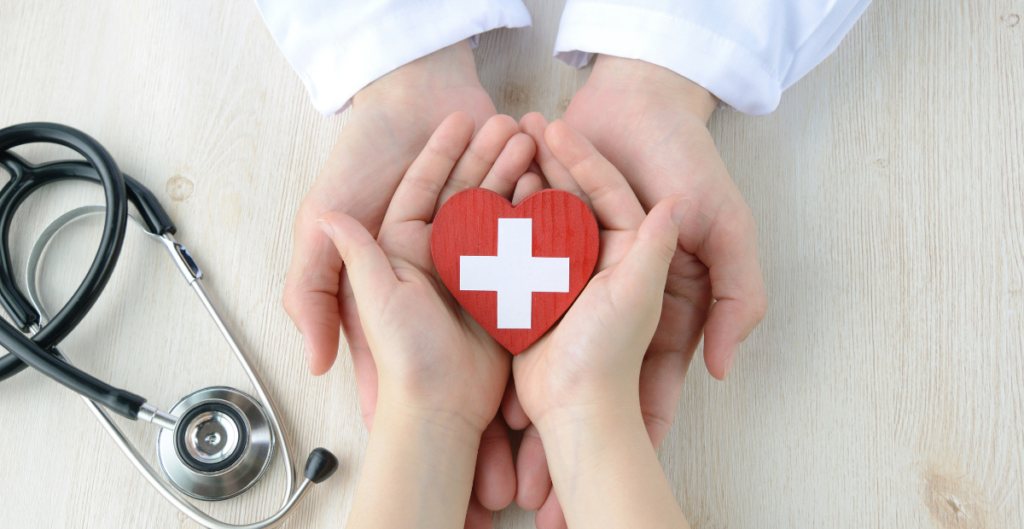
Side Effects of Antibiotics and Drinking Alcohol
Alcohol interacts directly with some antibiotics and can cause dangerous side effects or make them less effective at removing bacteria. When the body breaks down alcohol, it also produces acetaldehyde, which can cause nausea. Many people experience stomach or digestive side effects when taking antibiotics. Drinking alcohol while taking antibiotics may increase this feeling of nausea due to the combined side effects. [4]
Penicillins
The effectiveness of the antibiotic will not be reduced and there are no interactions between penicillin and alcohol. Keep in mind though that the side effects of alcohol and antibiotics can reduce your energy and delay how quickly you recover from illness.
Cephalosporins
The antibiotic cephalosporin cefotetan slows alcohol breakdown, leading to a rise in levels of a substance called acetaldehyde. This can cause a host of unpleasant symptoms including nausea, vomiting, facial flushing, headache, breathlessness, and chest pain.
Aminoglycosides
Many people taking antibiotics already experience stomach or digestive side effects, and drinking alcohol while on these medications can increase feelings of nausea. In addition to gastrointestinal issues, both alcohol and antibiotics such as aminoglycosides can hinder cognitive function, concentration, and coordination.
Tetracyclines
The tetracycline class of antibiotics includes doxycycline and minocycline. This class can treat a wide range of bacterial infections. People should not drink alcohol while taking doxycycline because this may reduce the effects of the antibiotic.
Macrolides
Most antibiotics prescribed in general practice do not require abstinence from alcohol. Penicillins, cephalosporins, macrolides, and tetracyclines do not present a hazard with alcohol, but the condition being treated may warrant avoiding alcohol.
Fluoroquinolones
People with a history of seizures are most at risk. Since alcohol lowers the seizure threshold, doctors advise people with a history of seizures to avoid mixing alcohol and fluoroquinolones.
What are the Dangers of Mixing Prescription Drugs With Alcohol?
If you’re taking any medications—either those prescribed by a doctor or over-the-counter cold and allergy medicine—it’s not a good idea to drink alcohol. Often, the medication label will warn you not to—because of the possible dangerous side effects. Read the label! You’ll find lots of good info, like:
- The medication’s active ingredients, including ingredient amounts in each dose
- The medication’s purpose and uses
- Dosage instructions—when and how to take it
- Specific warnings about interactions (with alcohol and other drugs)
- Activities to avoid
- The medication’s inactive ingredients (important to help people avoid an allergic reaction)
Some medications—including many popular painkillers and cough, cold, and allergy remedies—contain more than one ingredient that can react with alcohol. Read the label on the medication bottle to find out exactly what ingredients a medicine contains. Ask your pharmacist if you have any questions about how alcohol might interact with a drug you are taking.

Health Risks
Women, in general, have a higher risk for problems than men. When a woman drinks, the alcohol in her bloodstream typically reaches a higher level than a man’s even if both are drinking the same amount. This is because women’s bodies generally have less water than men’s bodies. Because alcohol mixes with body water, a given amount of alcohol is more concentrated in a woman’s body than in a man’s. As a result, women are more susceptible to alcohol-related damage to organs such as liver damage.
Mixing alcohol and medicines can be harmful. Alcohol, like some medicines, can make you sleepy, drowsy, or lightheaded. Drinking alcohol while taking medicines can intensify these effects. You may have trouble concentrating or performing mechanical skills. Small amounts of alcohol can make it dangerous to drive, and when you mix alcohol with certain medicines you put yourself at even greater risk. Combining alcohol with some medicines can lead to falls and serious injuries, especially among older people.
Older people are at particularly high risk for harmful antibiotics and alcohol interactions. Aging slows the body’s ability to break down alcohol, so alcohol remains in a person’s system longer. Older people also are more likely to take a medication that interacts with alcohol—in fact, they often need to take more than one of these medications.
Mixing Antibiotics and Alcohol Interaction Infographic
The effectiveness of your antibiotic will not typically be decreased by combining it with alcohol. Still, it may have undesirable side effects and interfere with your body’s ability to heal itself.
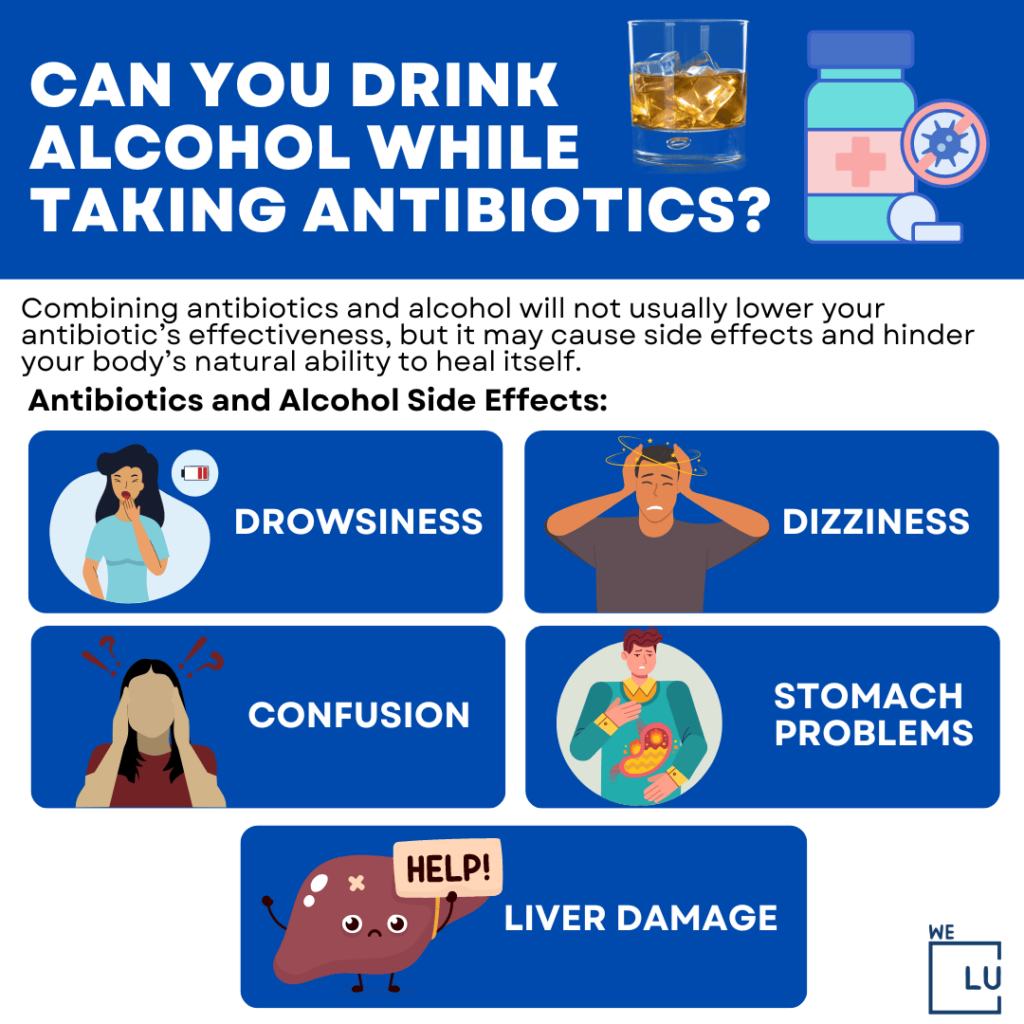
Embed the above “Can You Drink Alcohol While Taking Antibiotics?” Infographic to your Website. This infographic is provided by the We Level Up Addiction Treatment Center team. To use the above infographics, you agree to link back and attribute its source and owner at https://weleveluptx.com/antibiotics-and-alcohol/
Can You Drink Alcohol While Taking Antibiotics? image link: https://weleveluptx.com/wp-content/uploads/2024/01/Can-You-Drink-Alcohol-While-Taking-Antibiotics-1024×1024.png
Alcohol Use Disorder Treatment
Mixing antibiotics and alcohol puts you at risk for dangerous reactions. Protect yourself by avoiding alcohol if you are taking a medication and don’t know its effect. To learn more about a medicine and whether it will interact with alcohol, talk to your pharmacist or other health care provider.
Mixing any combination of prescription drugs, over-the-counter drugs, illicit drugs, and alcohol can be unpredictable and dangerous. Most fatal overdoses involve the use of more than one type of drug (poly-drug use). Mixing prescription drugs with alcohol is dangerous because different drugs act on our bodies in different ways. The harmful effects are magnified by using more than one drug type. For example, the more alcohol in the body, the less heroin needed to cause an overdose.
Treatment for alcohol and drug addiction includes medications that can help people get control without a high chance of addiction. Typically, a key part of treatment is counseling or psychotherapy. It may also require withdrawal detoxification, addiction medicine, and recovery support.
Call today to speak with one of our treatment specialists here at We Level Up TX. Addiction specialists know what you are going through and will answer any of your questions about the dangers of mixing antibiotics and alcohol. Your call is private and confidential and there is never any obligation.
Sources:
[1] Fact versus Fiction: a Review of the Evidence behind Alcohol and Antibiotic Interactions – National Center for Biotechnology Information, U.S. National Library of Medicine
[2] Antibiotics and Alcohol – https://www.healthline.com/health/antibiotics-alcohol#alcohol-and-infections
[3] The Dangers of Mixing Alcohol and Medications – https://www.verywellmind.com/mixing-alcohol-and-medication-harmful-interactions-67888
[4] Can you drink antibiotics and alcohol? – https://www.medicalnewstoday.com/articles/324991



